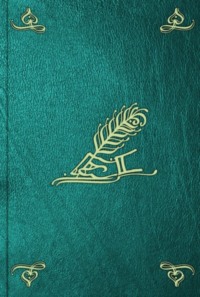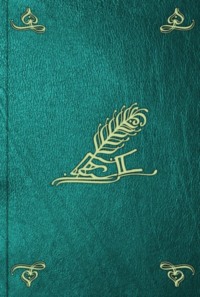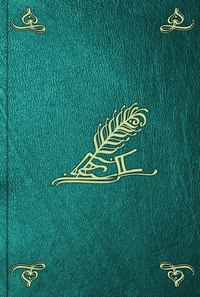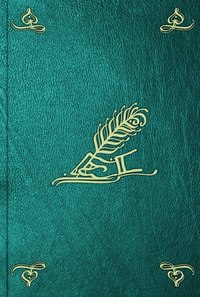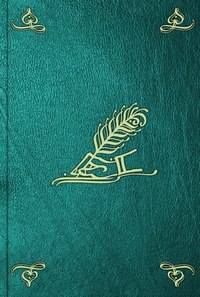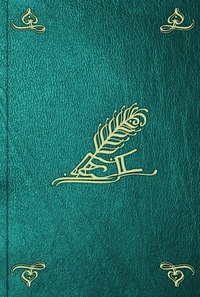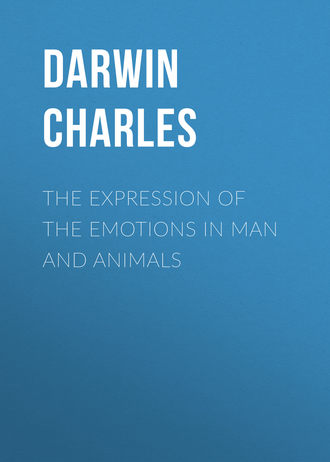 полная версия
полная версияThe Expression of the Emotions in Man and Animals
1304 (return)
[ Lieber 'On the Vocal Sounds,' &c.; Smithsonian Contributions, 1851, vol. ii. p. 6.]
1305 (return)
[ Ibid. p. 182.]
1306 (return)
[ Moreau, in edit. of 1820 of Lavater, vol. iv. p. 303.]
1307 (return)
[ Burgess. ibid. p. 38, on paleness after blushing, p. 177.]
1308 (return)
[ See Lavater, edit. of 1820, vol. iv. p. 303.]
1309 (return)
[ Burgess, ibid. pp. 114, 122. Moreau in Lavater, ibid. vol. iv. p. 293.]
1310 (return)
[ 'Letters from Egypt,' 1865, p. 66. Lady Gordon is mistaken when she says Malays and Mulattoes never blush.]
1311 (return)
[ Capt. Osborn ('Quedah,' p. 199), in speaking of a Malay, whom he reproached for cruelty, says he was glad to see that the man blushed.]
1312 (return)
[ J. R. Forster, 'Observations during a Voyage round the World,' 4to, 1778, p. 229. Waitz gives ('Introduction to Anthropology,' Eng. translat. 1863, vol. i. p. 135) references for other islands in the Pacific. See, also, Dampier 'On the Blushing of the Tunquinese' (vol. ii. p. 40); but I have not consulted this work. Waitz quotes Bergmann, that the Kalmucks do not blush, but this may be doubted after what we have seen with respect to the Chinese. He also quotes Roth, who denies that the Abyssinians are capable of blushing. Unfortunately, Capt. Speedy, who lived so long with the Abyssinians, has not answered my inquiry on this head. Lastly, I must add that the Rajah Brooke has never observed the least sign of a blush with the Dyaks of Borneo; on the contrary under circumstances which would excite a blush in us, they assert "that they feel the blood drawn from their faces."]
1313 (return)
[ Transact. of the Ethnological Soc. 1870, vol. ii. p. 16.]
1314 (return)
[ Humboldt, 'Personal Narrative,' Eng. translat. vol. iii. p. 229.]
1315 (return)
[ Quoted by Prichard, Phys. Hist. of Mankind, 4th edit 1851, vol. i. p. 271.]
1316 (return)
[ See, on this head, Burgess, ibid. p. 32. Also Waitz, 'Introduction to Anthropology,' Eng. edit. vol. i. p. 139. Moreau gives a detailed account ('Lavater,' 1820, tom. iv. p. 302) of the blushing of a Madagascar negress-slave when forced by her brutal master to exhibit her naked bosom.]
1317 (return)
[ Quoted by Prichard, Phys. Hist. of Mankind, 4th edit. 1851, vol. i. p. 225.]
1318 (return)
[ Burgess, ibid. p. 31. On mulattoes blushing, see p. 33. I have received similar accounts with respect to, mulattoes.]
1319 (return)
[ Barrington also says that the Australians of New South Wales blush, as quoted by Waitz, ibid. p. 135.]
1320 (return)
[ Mr. Wedgwood says (Dict. of English Etymology, vol. iii. 1865, p. 155) that the word shame "may well originate in the idea of shade or concealment, and may be illustrated by the Low German scheme, shade or shadow." Gratiolet (De la Phys. pp. 357-362) has a good discussion on the gestures accompanying shame; but some of his remarks seem to me rather fanciful. See, also, Burgess (ibid. pp. 69, 134) on the same subject.]
1321 (return)
[ Burgess, ibid. pp. 181, 182. Boerhaave also noticed (as quoted by Gratiolet, ibid. p. 361) the tendency to the secretion of tears during intense blushing. Mr. Bulmer, as we have seen, speaks of the "watery eyes" of the children of the Australian aborigines when ashamed.]
1322 (return)
[ See also Dr. J. Crichton Browne's Memoir on this subject in the 'West Riding Lunatic Asylum Medical Report,' 1871, pp. 95-98.]
1323 (return)
[ In a discussion on so-called animal magnetism in 'Table Talk,' vol. i.]
1324 (return)
[ Ibid. p. 40.]
1325 (return)
[ Mr. Bain ('The Emotions and the Will,' 1865, p. 65) remarks on "the shyness of manners which is induced between the sexes… from the influence of mutual regard, by the apprehension on either side of not standing well with the other."]
1326 (return)
[ See, for evidence on this subject, 'The Descent of Man,' &c., vol. ii. pp. 71, 341.]
1327 (return)
[ H. Wedgwood, Dict. English Etymology, vol. iii. 1865, p. 184. So with the Latin word verecundus.]
1328 (return)
[ Mr. Bain ('The Emotions and the Will,' p. 64) has discussed the "abashed" feelings experienced on these occasions, as well as the stage-fright of actors unused to the stage. Mr. Bain apparently attributes these feelings to simple apprehension or dread.]
1329 (return)
[ 'Essays on Practical Education,' by Maria and R. L. Edgeworth, new edit. vol. ii. 1822, p. 38. Dr. Burgess (ibid. p. 187) insists strongly to the same effect.]
1330 (return)
[ 'Essays on Practical Education,' by Maria and R. L. Edgeworth, new edit. vol. ii. 1822, p. 50.]
1331 (return)
[ Bell, 'Anatomy of Expression,' p. 95. Burgess, as quoted below, ibid. p. 49. Gratiolet, De la Phys. p. 94.]
1332 (return)
[ On the authority of Lady Mary Wortley Montague; see Burgess, ibid. p. 43.]
1333 (return)
[ In England, Sir H. Holland was, I believe, the first to consider the influence of mental attention on various parts of the body, in his 'Medical Notes and Reflections,' 1839 p. 64. This essay, much enlarged, was reprinted by Sir H. Holland in his 'Chapters on Mental Physiology,' 1858, p. 79, from which work I always quote. At nearly the same time, as well as subsequently, Prof. Laycock discussed the same subject: see 'Edinburgh Medical and Surgical Journal,' 1839, July, pp. 17-22. Also his 'Treatise on the Nervous Diseases of Women,' 1840, p. 110; and 'Mind and Brain,' vol. ii. 1860, p. 327. Dr. Carpenter's views on mesmerism have a nearly similar bearing. The great physiologist Muller treated ('Elements of Physiology,' Eng. translat. vol. ii. pp. 937, 1085) of the influence of the attention on the senses. Sir J. Paget discusses the influence of the mind on the nutrition of parts, in his 'Lectures on Surgical Pathology,' 1853, vol. i. p. 39: 1 quote from the 3rd edit. revised by Prof. Turner, 1870, p. 28. See, also, Gratiolet, De la Phys. pp. 283-287.]
1334 (return)
[ De la Phys. p. 283.]
1340 (return)
[ Dr. Maudsley has given ('The Physiology and Pathology of Mind,' 2nd edit. 1868, p. 105), on good authority, some curious statements with respect to the improvement of the sense of touch by practice and attention. It is remarkable that when this sense has thus been rendered more acute at any point of the body, for instance, in a finger, it is likewise improved at the corresponding point on the opposite side of the body.]
1341 (return)
[ The Lancet,' 1838, pp. 39-40, as quoted by Prof. Laycock, 'Nervous Diseases of Women,' 1840, p. 110.]
1342 (return)
[ 'Chapters on Mental Physiology,' 1858, pp. 91-93.]
1343 (return)
[ 'Lectures on Surgical Pathology,' 3rd edit. revised by Prof. Turner, 1870, pp. 28, 31.]
1344 (return)
[ 'Elements of Physiology,' Eng. translat. vol. ii. p. 938.]
1345 (return)
[ Prof. Laycock has discussed this point in a very interesting manner. See his 'Nervous Diseases of Women,' 1840, p. 110.]
1346 (return)
[ See, also, Mr. Michael Foster, on the action of the vaso-motor system, in his interesting Lecture before the royal Institution, as translated in the 'Revue des Cours Scientifiques,' Sept. 25, 1869, p. 683.]
1401 (return)
[ See the interesting facts given by Dr. Bateman on 'Aphasia,' 1870, p. 110.]
1402 (return)
[ 'La Physionomie et la Parole,' 1865, pp. 103, 118.]
1403 (return)
[ Rengger, 'Naturgeschichte der Saugethiere von Paraguay,' 1830, s. 55.]
1404 (return)
[ Quoted by Moreau, in his edition of Lavater, 1820, tom. iv. p. 211.]
1405 (return)
[ Gratiolet ('De la Physionomie,' 1865, p. 66) insists on the truth of this conclusion.]



